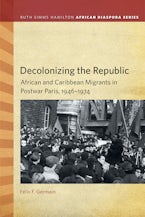Decolonizing the Republic is a conscientious discussion of the African diaspora in Paris in the post–World War II period. This book is the first to examine the intersection of black activism and the migration of Caribbeans and Africans to Paris during this era and, as Patrick Manning notes in the foreword, successfully shows how “black Parisians—in their daily labors, weekend celebrations, and periodic protests—opened the way to ‘decolonizing the Republic,’ advancing the respect for their rights as citizens.” Contrasted to earlier works focusing on the black intellectual elite, Decolonizing the Republic maps the formation of a working-class black France. Readers will better comprehend how those peoples of African descent who settled in France and fought to improve their socioeconomic conditions changed the French perception of Caribbean and African identity, laying the foundation for contemporary black activists to deploy a new politics of social inclusion across the demographics of race, class, gender, and nationality. This book complicates conventional understandings of decolonization, and in doing so opens a new and much-needed chapter in the history of the black Atlantic.
ContentsForeword, Patrick ManningPrefaceIntroductionChapter One. Black Internationalism and Student Activism in Paris of the FiftiesChapter Two. African Migration to Paris of the SixtiesChapter Three. French Documentaries and the Representation of African ExperiencesChapter Four. Work, Housing, Colonial Relations, and the Formation of Oppositional Identities among Working-Class African WorkersChapter Five. Caribbean Women in Postwar France, 1946–1974Chapter Six. Henri Salvador’s Music and Working-Class Caribbean Males in Paris of the SixtiesChapter Seven. French Labor Unions, Black Community and Political Activism, and Decolonization in Postcolonial Paris, 1960–1974Chapter Eight. May ’68 in BlackChapter Nine. Music, Le Pen, and “New” Black Activism in Contemporary France, 1974–2005ConclusionNotesBibliographyIndex

